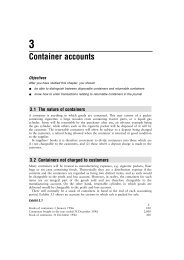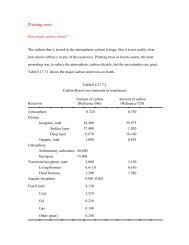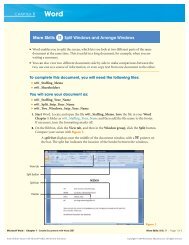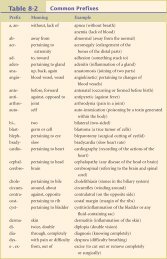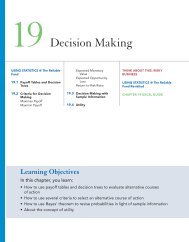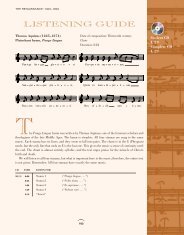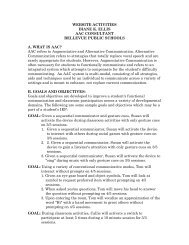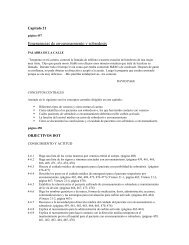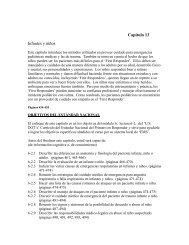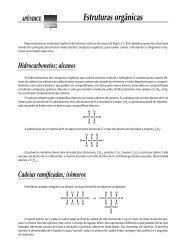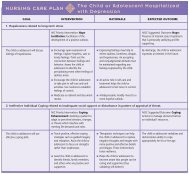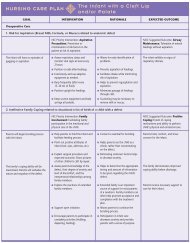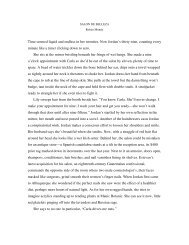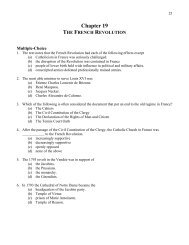French Verb Primer by Helene Gallier-Morgan Regular ... - Pearson
French Verb Primer by Helene Gallier-Morgan Regular ... - Pearson
French Verb Primer by Helene Gallier-Morgan Regular ... - Pearson
You also want an ePaper? Increase the reach of your titles
YUMPU automatically turns print PDFs into web optimized ePapers that Google loves.
<strong>French</strong> <strong>Verb</strong> <strong>Primer</strong><br />
<strong>by</strong> <strong>Helene</strong> <strong>Gallier</strong>-<strong>Morgan</strong><br />
<strong>Regular</strong> <strong>Verb</strong>s in the Present Indicative<br />
Irregular <strong>Verb</strong>s in thePresent Indicative (A-C)<br />
Irregular <strong>Verb</strong>s in thePresent Indicative (D-M)<br />
Irregular <strong>Verb</strong>s in thePresent Indicative (N-P)<br />
Irregular <strong>Verb</strong>s in thePresent Indicative (R-S)<br />
Irregular <strong>Verb</strong>s in thePresent Indicative (T-Z)<br />
<strong>Regular</strong> Part Participles<br />
Irregular Past Participles<br />
Agreement of Past Participles<br />
Passé Composé<br />
Use of the Passé Composé<br />
Conjugation of <strong>Verb</strong>s in the 'Imparfait'<br />
Use of the 'Imparfait'<br />
Conjugation of <strong>Verb</strong>s in the 'Plus-Que-Parfait'<br />
Use of the 'Plus-que-Parfait'<br />
The Imperative Mood<br />
<strong>Regular</strong> <strong>Verb</strong>s in the 'Futur Simple'<br />
Irregular <strong>Verb</strong>s in the 'Futur Simple'<br />
The 'Futur Antérieur'<br />
Use of the 'Futur Antérieur'<br />
Futur Proche<br />
<strong>Regular</strong> <strong>Verb</strong>s in the Present Subjunctive<br />
Irregular <strong>Verb</strong>s in the Present Subjucntive<br />
<strong>Regular</strong> <strong>Verb</strong>s in the Present Conditional<br />
Irregular <strong>Verb</strong>s in the Present Conditional<br />
Conjugation of <strong>Verb</strong>s in the Past Conditional<br />
REGULAR VERBS IN THE PRESENT INDICATIVE<br />
1. ER verbs: remove the 'er' ending of the infinitive and replace it <strong>by</strong>: e/es/e/ons/ez/ent. Ex: rester:<br />
reste/restes/reste/restons/restez/restent.<br />
a) Vbs with a mute e in the infinitive: add an 'accent grave' when there is also a mute e in the next syllable.<br />
Ex: lever: lève/lèves/lève/levons/levez/lèvent.<br />
b) Vbs with an é in the infinitive: change the é for an è when there is a mute e in the next syllable. Ex: régler:<br />
règle/règles/règle/réglons/réglez/règlent.<br />
c) With verbs like 'appeler,' the l is doubled between two mute e :<br />
appelle/appelles/appelle/appelons/appelez/appellent.<br />
d) Vbs ending in oyer + uyer in the infinit.:y is changed to i before a mute e: Ex: envoyer:<br />
envoie/envoies/envoie/envoyons/envoyez/envoient. Vbs ending in ayer: Ex: payer: paie/paye paies/payes<br />
paie/paye payons payez paient/payent.<br />
e) Vbs ending in cer in the infinit.: add a cedilla under the c in the first person plural. Ex: lancer:<br />
lance/lances/lance/lançons/lancez/lancent.<br />
f) Vbs ending in ger in the infinit.: add an e between -g and the -ons ending: Ex: manger: mange/manges/mange<br />
/mangeons/mangez/mangent.<br />
2. IR verbs: remove the 'ir' ending of the infinitive and replace it <strong>by</strong>: is/is/it/issons/issez/issent Ex: finir : Je<br />
finis/Tu finis/Il, elle finit/Nous finissons/Vous finissez/Ils, elles finissent.<br />
Copyright © 2007 <strong>Pearson</strong> Education Canada<br />
1
3. RE verbs: remove the 're' ending of the infinitive and replace it <strong>by</strong>: s/s/-/ons/ez/ent Ex: attendre :<br />
J'attends/Tu attends/Il, elle attend/Nous attendons/Vous attendez/Ils, elles attendant.<br />
IRREGULAR VERBS IN THE PRESENT INDICATIVE (A-C)<br />
aller: vais/vas/va/allons/llez/vont<br />
apercevoir: aperçois/aperçois/aperçoit/apercevons/apercevez/aperçoivent<br />
apprendre: apprends/apprends/apprend/apprenons/apprenez/apprennent<br />
s'asseoir: m'assieds/t'assieds/s'assied/nous asseyons/vous asseyez/s'asseyent<br />
atteindre: atteins/atteins/atteint/atteignons/atteignez/atteignent<br />
avoir: ai/as/a/avons/avez/ont<br />
se battre: me bats/te bats/se bat/nous battons/vous battez/se battent<br />
boire: bois/bois/boit/buvons/buvez/boivent<br />
comprendre: comprends/comprends/comprend/comprenons/comprenez/comprennent<br />
conduire: conduis/conduis/conduit/conduisons/conduisez/conduisent<br />
connaître: connais/connais/connaît/connaissons/connaissez/connaissent<br />
coudre: couds/couds/coud/cousons/cousez/cousent<br />
courir: cours/cours/court/courons/courez/courent<br />
craindre: crains/crains/craint/craignons/craignez/craignent<br />
croire: crois/crois/croit/croyons/croyez/croient<br />
IRREGULAR VERBS IN THE PRESENT INDICATIVE (D-M)<br />
devenir: deviens/deviens/devient/devenons/devenez/deviennent<br />
devoir: dois/dois/doit/devons/devez/doivent<br />
dire: dis/dis/dit/disons/dites/disent<br />
dormir: dors/dors/dort/dormons/dormez/dorment<br />
écrire: écris/écris/écrit/écrivons/écrivez/écrivent<br />
s'endormir: m'endors/t'endors/s'endort/nous endormons/vous endormez/s'endorment<br />
éteindre: éteins/éteins/éteint/éteignons/éteignez/éteignent<br />
être: suis/es/est/sommes/êtes/sont<br />
faire: fais/fais/fait/faisons/faites/font<br />
falloir: il faut<br />
interdire: interdis/interdis/interdit/interdisons/interdisez/interdisent<br />
joindre: joins/joins/joint/joignons/joignez/joignent<br />
lire: lis/lis/lit/lisons/lisez/lisent<br />
mettre: mets/mets/met/mettons/mettez/mettent<br />
mourir: meurs/meurs/meurt/mourons/mourez/meurent<br />
IRREGULAR VERBS IN THE PRESENT INDICATIVE (N-P)<br />
obtenir: obtiens/obtiens/obtient/obtenons/obtenez/obtiennent<br />
offrir: offre/offres/offre/offrons/offrez/offrent<br />
ouvrir: ouvre/ouvres/ouvre/ouvrons/ouvrez/ouvrent<br />
Copyright © 2007 <strong>Pearson</strong> Education Canada<br />
2
partir: pars/pars/part/partons/partez/partent<br />
peindre: peins/peins/peint/peignons/peignez/peignent<br />
permettre: permets/permets/permet/permettons/permettez/permettent<br />
se plaindre: me plains/te plains/se plaint/nous plaignons/vous plaignez/se plaignent<br />
plaire: plais/plais/plaît/plaisons/plaisez/plaisent<br />
pleuvoir: il pleut<br />
prendre: prends/prends/prend/prenons/prenez/prennent<br />
prévenir: préviens/préviens/prévient/prévenons/prévenez/préviennent<br />
promettre: promets/promets/promet/promettons/promettez/promettent<br />
pouvoir: peux/peux/peut/pouvons/pouvez/peuvent<br />
IRREGULAR VERBS IN THE PRESENT INDICATIVE (R-S)<br />
recevoir: reçois/reçois/reçoit/recevons/recevez/reçoivent<br />
reconnaître: reconnais/reconnais/reconnaît/reconnaissons/reconnaissez/reconnaissent<br />
rejoindre: rejoins/rejoins/rejoint/rejoignons/rejoignez/rejoignent<br />
remettre: remets/remets/remet/remettons/remettez/remettent<br />
repeindre: repeins/repeins/repeint/repeignons/repeignez/repeignent<br />
revenir: reviens/reviens/revient/revenons/revenez/reviennent<br />
rire: ris/ris/rit/rions/riez/rient<br />
savoir: sais/sais/sait/savons/savez/savent<br />
servir: sers/sers/sert/servons/servez/servent<br />
sortir: sors/sors/sort/sortons/sortez/sortent<br />
souffrir: souffre/souffres/souffre/souffrons/souffrez/souffrent<br />
sourire: souris/souris/sourit/sourions/souriez/sourient<br />
se souvenir: me souviens/te souviens/se souvient/nous souvenons/vous souvenez/se souviennent<br />
suivre: suis/suis/suit/suivons/suivez/suivent<br />
IRREGULAR VERBS IN THE PRESENT INDICATIVE (T-Z)<br />
se taire: me tais/te tais/se tait/nous taisons/vous taisez/se taisent<br />
teindre: teins/teins/teint/teignons/teignez/teignent<br />
tenir: tiens/tiens/tient/tenons/tenez/tiennent<br />
valoir: il vaut<br />
venir: viens/viens/vient/venons/venez/viennent<br />
vivre: vis/vis/vit/vivons/vivez/vivent<br />
voir: vois/vois/voit/voyons/voyez/voient<br />
vouloir: veux/veux/veut/voulons/voulez/veulent<br />
REGULAR PAST PARTICIPLES<br />
1. To form the past participle of 'ER' verbs, remove the -er ending of the infinitive and replace it <strong>by</strong> 'é.' Ex:<br />
appeler Past participle ---> appelé<br />
Copyright © 2007 <strong>Pearson</strong> Education Canada<br />
3
2. To form the past participle of 'IR' verbs, remove the -ir ending of the infinitive and replace it <strong>by</strong> 'i.' Ex: finir<br />
Past participle ---> fini<br />
3. To form the past participle of 'RE' verbs, remove the -re ending of the infinitive and replace it <strong>by</strong> 'u.' Ex:<br />
répondre Past participle ---> répondu<br />
IRREGULAR PAST PARTICIPLES<br />
VERBS PAST PART ICIPLES<br />
apercevoir aperçu<br />
apprendre appris<br />
s'asseoir assis<br />
atteindre atteint<br />
avoir eu<br />
boire bu<br />
comprendre compris<br />
conduire conduit<br />
connaître connu<br />
courir couru<br />
craindre craint<br />
croire cru<br />
cuire cuit<br />
devenir devenu<br />
devoir dû<br />
dire dit<br />
écrire écrit<br />
éteindre éteint<br />
être été<br />
faire fait<br />
falloir fallu<br />
interdire interdit<br />
joindre joint<br />
lire lu<br />
mettre mis<br />
mourir mort<br />
naître né<br />
obtenir obtenu<br />
offrir offert<br />
ouvrir ouvert<br />
peindre peint<br />
permettre permis<br />
se plaindre plaint<br />
plaire plu<br />
pleuvoir plu<br />
pouvoir pu<br />
prendre pris<br />
prévenir prévenu<br />
promettre promis<br />
Copyright © 2007 <strong>Pearson</strong> Education Canada<br />
4
ecevoir reçu<br />
reconnaître reconnu<br />
rejoindre rejoint<br />
remettre remis<br />
repeindre repeint<br />
revenir revenu<br />
rire ri<br />
savoir su<br />
sourire souri<br />
se souvenir souvenu<br />
suivre suivi<br />
se taire tu<br />
teindre teint<br />
tenir tenu<br />
valoir valu<br />
venir venu<br />
vivre vécu<br />
voir vu<br />
vouloir voulu<br />
AGREEMENT OF PAST PARTI CIPLES<br />
1. The past participle of a verb conjugated with 'avoir' agrees in gender and in number with a preceding direct<br />
object pronoun. Ex: J'ai rangé les documents./Je les ai rangés.<br />
2. The past participle of a simple verb conjugated with 'être' agrees in gender and in number with the subject.<br />
Ex: Nous sommes allés au cinéma.<br />
3. The past participle of a verb intrinsically reflexive agrees in gender and in number with the reflexive pronoun.<br />
Ex: Elle s'est dépêchée de partir.<br />
4. The past participle of a verb made reflexive agrees in gender and in number with the reflexive pronoun, if the<br />
latter is a direct object; if it is not, the past participle does not agree with it, but agrees with a preceding direct<br />
object pronoun. Ex: Ils se sont vus. (The reflexive pronoun 'se' is a direct object.) Ex: Ils se sont parlé. The<br />
reflexive pronoun 'se' is an indirect object.) Ex: Elle s'est lavé les mains./Elle se les est lavées.(The reflex.<br />
pronoun 'se' is an indirect obj.. The past part. agrees with the direct obj. pronoun 'les.'<br />
PASSE COMPOSE<br />
The 'passé composé' is formed <strong>by</strong> combining the past participle of the main verb with an auxiliary verb (avoir or<br />
être) in the present indicative.<br />
Ex: PARLER : J'ai parlé/Tu as parlé/Elle a parlé/Nous avons parlé/Vous avez parlé/Elles ont parlé.<br />
Ex: ALLER : Je suis allé(e)/Tu es allé(e)/Il est allé/Nous sommes allé(e)s/Vous êtes allé(e)(s)(es)/Ils sont allés.<br />
1. Most simple verbs are conjugated with 'avoir.'<br />
2. All reflexive verbs are conjugated with 'être.'<br />
3. The following simple verbs are conjugated with 'être': aller, arriver, descendre, devenir, entrer, monter, mourir,<br />
naître, partir, rentrer, repartir, rester, retourner, revenir, sortir, tomber, venir.<br />
N.B. The verbs 'descendre,' 'monter,' 'sortir,' and 'rentrer' are conjugated with 'avoir' when they take direct<br />
objects.<br />
Copyright © 2007 <strong>Pearson</strong> Education Canada<br />
5
The 'passé composé' is used for actions completed in the past.<br />
Ex: J'ai répondu I answered/I have answered<br />
Ex: Elle est partie She left/She has left<br />
To conjugate a verb in the 'imparfait,' use the stem of the first person plural of the present indicative. Remove<br />
the -ons ending and replace it with the following endings of the 'imparfait': ais/ais/ait/ions/iez/aient.<br />
Ex: écrire<br />
Present indicative: nous écrivons<br />
Imparfait: J'écrivais/Tu écrivais/Il, elle écrivait/Nous écrivions/Vous écriviez/Ils, elles écrivaient.<br />
1. With verbs ending in -ger in the infinitive, the 'e' placed, in the present indicative, between 'g' and the -ons<br />
ending is kept in the 'imparfait' between 'g' and the endings 'ais,' 'ait,' and 'aient' — but not between 'g' and the<br />
endings 'ions' and 'iez.'<br />
Ex: Ranger<br />
Present indicative: nous rangeons<br />
Imparfait: Je rangeais/Tu rangeais/Il, elle rangeait/Nous rangions/Vous rangiez/Ils, elles rangeaient.<br />
2. With verbs ending in -cer in the infinitive, the cedilla placed under the 'c' in the first person plural of the<br />
present indicative is kept, in the 'imparfait,' before 'a' in the endings 'ais,' 'ait,' and 'aient' — but not before 'i' in the<br />
endings 'ions' and 'iez.'<br />
Ex: Commencer<br />
Present indicative: nous commençons<br />
Imparfait : Je commençais/Tu commençais/Il, elle commençait/Nous commencions/Vous commenciez/Ils,<br />
elles commençaient.<br />
3. With verbs having an 'i' at the end of the stem in the first person plural of the present indicative, there are two<br />
'i' in the first and second persons plural of the 'imparfait.'<br />
Ex: Rire<br />
Present indicative: nous rions<br />
Imparfait : Je riais/Tu riais/Il, elle riait/Nous riions/Vous riiez/Ils, elles riaient.<br />
4. In the 'imparfait', all verbs follow the same conjugation system, except 'être' which is irregular.<br />
être : J'étais/Tu étais/Il, elle était/Nous étions/Vous étiez/Ils, elles étaient<br />
5. Impersonal verbs take the following forms in the 'imparfait':<br />
Falloir : Il fallait<br />
Neiger : Il neigeait<br />
Pleuvoir : Il pleuvait<br />
Valoir : Il valait<br />
USE OF THE 'PASSE COMPOSE' ´<br />
CONJUGATION OF VERBS IN THE 'IMPARFAIT '<br />
Copyright © 2007 <strong>Pearson</strong> Education Canada<br />
6
USE OF THE 'IMPARFAIT'<br />
1. A verb in the present indicative in a direct question or statement always takes the 'imparfait' form in indirect<br />
speech in the past. Ex: "Je viens." Elle m'a dit qu'elle venait. (She told me that she was coming.)<br />
2. When telling a story, the 'imparfait' is used to present actions completed in the past and repeated on a regular<br />
basis (every day, every year, etc.). Thus, the tense indicates what people used to do at a certain time in their lives,<br />
or how things used to be in the past. Ex: Quand j'étais enfant, je passais mes vacances chez ma tante. When I<br />
was a child, I used to spend my holidays at my aunt's.<br />
3. The 'imparfait' is used as a past progressive to indicate that an action lasted for an indefinite period. In this<br />
case, the <strong>French</strong> 'imparfait' corresponds to the English 'was/were + ing' form. Ex: Quand je suis arrivée, il lisait.<br />
(When I arrived, he was reading.)<br />
4. When telling a story in the past, the descriptive part (background, setting, surroundings, etc.) is in the<br />
imparfait.<br />
CONJUGATION OF VERBS IN THE 'PLUS-QUE-PARFAIT'<br />
The 'plus-que-parfait' is a compound past tense. It is formed <strong>by</strong> combining the past participle of the main verb<br />
and the auxiliary verbs 'être' or 'avoir' in the 'imparfait.' The verbs conjugated with 'être' in the 'plus-que-parfait'<br />
are those which also take 'être' in the 'passé composé' (reflexive verbs, and the following simple verbs: aller,<br />
arriver, descendre, devenir, entrer, monter, mourir, naître, partir, rentrer, repartir, rester, retourner, revenir,<br />
sortir, tomber, venir). The same rules of agreement of the past participle in the 'passé composé' are applied in<br />
the 'plus-que-parfait.'<br />
Ex: recevoir : J'avais reçu/Tu avais reçu/Il avait reçu/Nous avions reçu/Vous aviez reçu/Ils avaient reçu<br />
Ex: aller : J'étais allé(e)/Tu étais allé(e)/Il était allé/Nous étions allé(e)s/Vous étiez allé(e)(s)(es)/Ils étaient allés<br />
USE OF THE 'PLUS-QUE-PAR FAIT'<br />
1. A verb in the 'passé composé' in a direct question or statement always takes the 'plus-que-parfait' form in<br />
indirect speech in the past. Ex: "J'ai pris les documents." Marie m'a dit qu'elle avait pris les documents.<br />
2. In narrative, the <strong>French</strong> 'plus-que-parfait' corresponds to the English pluperfect. It is used to indicate that a<br />
completed action took place, at one moment, before another action in the past. Ex: Quand je leur ai offert de les<br />
aider, ils avaient déjà fini. When I offered to help them, they had already finished.<br />
THE IMPERATIVE MOOD<br />
The imperative mood presents an action in the form of a command or an exhortation. There are only three<br />
forms of the verb. Generally speaking, these forms are identical to those of the present indicative, without the<br />
subjects 'tu', 'nous' and 'vous'. Ex: finir : Finis|Finish, Finissons|Let's finish, Finissez|Finish<br />
With verbs having the endings 'es' and 'as' in the second person singular of the present indicative, the final 's' is<br />
dropped in the imperative, except when the verb is immediately followed <strong>by</strong> the pronouns 'en' and 'y' and these<br />
pronouns are attached to it. Ex: Prépare du café. Prépares-en Ex: Va à la bibliothèque. Vas-y Ex: Va acheter des<br />
crayons. Va en acheter. (The 's' of 'va' is dropped because the pronoun 'en' is not the object of 'va' but of<br />
'acheter.')<br />
Copyright © 2007 <strong>Pearson</strong> Education Canada<br />
7
The following verbs are irregular in the imperative in the sense that they have different forms from those of the<br />
present indicative.<br />
avoir : Aie/Ayons/Ayez<br />
être : Sois/Soyons/Soyez<br />
savoir : Sache/Sachons/Sachez<br />
vouloir : Veuillez<br />
N.B. In the imperative, the verb 'vouloir' is used for extra politeness to attenuate the command. It is used only in<br />
the second person plural. Ex: Veuillez prendre un numéro. (Please, take a number.)<br />
The endings of the 'futur simple' are: ai, as, a, ons, ez, ont. With regular 'ER' and 'IR' verbs, the endings are<br />
added to the infinitive. With regular 'RE' verbs, the 'e' of the infinitive ending is dropped before the endings of<br />
the 'futur simple' are added.<br />
Ex: étudier : J'étudierai/Tu étudieras/Il, elle étudiera/Nous étudierons/Vous étudierez/Ils, elles étudieront<br />
Ex: finir : Je finirai/Tu finiras/Il, elle finira/Nous finirons/Vous finirez/Ils, elles finiront<br />
Ex: prendre : Je prendrai/Tu prendras/Il, elle prendra/Nous prendrons/Vous prendrez/Ils, elles prendront<br />
1. With verbs like 'appeler', the 'l' is doubled between two mute 'e': appellerai, appelleras, appellera,<br />
appellerons, appellerez, appelleront.<br />
2. With verbs containing a mute 'e', an 'accent grave' is added whenever there is a mute 'e' in the next syllable.<br />
Ex: enlever: enlèverai, enlèveras, enlèvera, enlèverons, enlèverez, enlèveront.<br />
3. With verbs ending in -oyer and -uyer in the infinitive, 'y' is changed to 'i' before a mute 'e'. Ex: nettoyer:<br />
nettoierai, nettoieras, nettoiera, nettoierons, nettoierez, nettoieront. <strong>Verb</strong>s ending in 'ayer' in the infinitive may<br />
be conjugated in two different ways. Ex: essayer: essaierai, essaieras, essaier, essaierons, essaierez, essaierons, or:<br />
essayerai, essayeras, essayera, essayerons, essayerez, essayeront.<br />
In the 'futur simple', all irregular verbs have regular endings, but irregular stems.<br />
aller: j'irai<br />
apercevoir: j'apercevrai<br />
s'asseoir: je m'assiérai<br />
avoir: j'aurai<br />
courir: je courrai<br />
devenir: je deviendrai<br />
devoir: je devrai<br />
envoyer: j'enverrai<br />
être: je serai<br />
falloir: il faudra<br />
faire: je ferai<br />
mourir: je mourrai<br />
REGULAR VERBS IN THE 'FUTUR SIMPLE'<br />
IRREGULAR VERBS IN THE 'FUTUR SIMPLE'<br />
Copyright © 2007 <strong>Pearson</strong> Education Canada<br />
8
pleuvoir: il pleuvra<br />
pouvoir je pourrai<br />
recevoir: je recevrai<br />
renvoyer: je renverrai<br />
revenir: je reviendrai<br />
savoir: je saurai<br />
se souvenir: je me souviendrai<br />
tenir: je tiendrai<br />
venir: je viendrai<br />
voir: je verrai<br />
vouloir: je voudrai<br />
THE 'FUTUR ANTERIEUR'<br />
The 'futur antérieur' (future perfect) is a compound tense. It is formed <strong>by</strong> combining the past participle of the<br />
main verb and the auxiliary verbs 'être' or 'avoir' in the 'futur simple'. The verbs conjugated with 'être' in the<br />
'futur antérieur' are those which also take 'être' in the 'passé composé' (reflexive verbs, and the following simple<br />
verbs: aller, arriver, descendre, devenir, entrer, monter, mourir, naître, partir, rentrer, repartir, rester, retourner,<br />
revenir, sortir, tomber, venir).The same rules of agreement of the past participle in the 'passé composé' are<br />
applied in the 'futur antérieur.'<br />
Ex: finir : J'aurai fini/Tu auras fini/Il aura fini/Nous aurons fini/Vous aurez fini/Ils auront fini<br />
Ex: partir : /Je serai parti(e)/Tu seras parti(e)/Il sera parti/Nous serons parti(e)s/Vous serez parti(e)(s)(es)/Ils<br />
seront partis<br />
USE OF THE 'FUT UR ANTERIEUR'<br />
1. The 'futur antérieur' refers to a future action considered to be completed before other actions in the 'futur<br />
simple' begin. Ex: J'aurai fini avant ce soir. I will have finished <strong>by</strong> tonight. Ex: Quand il aura reçu ta lettre, il<br />
répondra à tes questions. When he has received your letter, he will answer your questions.<br />
N.B. In <strong>French</strong> - contrary to English - the verb in a subordinate clause with 'quand' (when), 'dès que' (as soon<br />
as) and 'aussitôt que' (as soon as) must be conjugated in a future tense whenever the verb in the main clause is in<br />
the future.<br />
2. The 'futur antérieur' can also be used to express a supposed reason for a completed action. Ex: Marie n'est pas<br />
encore rentrée. Elle sera restée au bureau. Marie is not back home yet. I guess she has stayed in the office.<br />
FUTUR PROCHE<br />
The 'futur proche' (immediate future) is formed with 'aller' in the present indicative; the main verb remains in<br />
the infinitive.<br />
Ex: faire<br />
Je vais le faire/I am going to do it<br />
Tu vas le faire/You are going to do it<br />
Il va le faire/He is going to do it<br />
Nous allons le faire/We are going to do it<br />
Vous allez le faire/You are going to do it<br />
Copyright © 2007 <strong>Pearson</strong> Education Canada<br />
9
Ils vont le faire/They are going to do it<br />
REGULAR VERBS IN THE PRESENT SUBJUNCTIVE<br />
To conjugate a regular verb in the present subjunctive, use the stem of the first person plural of the present<br />
indicative, remove the -ons ending and add the following endings of the present subjunctive:<br />
e/es/e/ions/iez/ent<br />
Ex: connaître<br />
Present indicative: nous connaissons<br />
Present subjunctive : Je connaisse/Tu connaisses/Il, elle connaisse/Nous connaissions/Vous connaissiez/Ils,<br />
elles connaissent<br />
1. With verbs like 'appeler,' the 'l' is doubled between two mute 'e': appelle, appelles, appelle, appelions, appeliez,<br />
appellent.<br />
2. 'Y' is changed to 'i' before a mute 'e' and after the vowels 'o' or 'u.' Ex: voir Present indicative: nous voyons<br />
Present subjunctive: voie, voies, voie, voyions, voyiez, voient.<br />
Before a mute 'e' and after the vowel 'a,' 'y' can be retained or changed to 'i.' Ex: essayer Present indicative: nous<br />
essayons Present subjunctive: essaie, essaies, essaie, essayions, essayiez, essaient or: essaye, essayes, essaye,<br />
essayions, essayiez, essayent.<br />
3. With verbs having an 'i' at the end of the stem in the present indicative, there are two 'i' in the first and second<br />
persons plural of the present subjunctive. Ex: rire Present indicative: nous rions Present subjunctive: rie, ries, rie,<br />
riions, riiez, rient.<br />
4. With verbs containing a mute 'e,' an 'accent grave' is added whenever there is another mute 'e' in the next<br />
syllable. Ex: enlever Present indicative: nous enlevons Present subjunctive: enlève, enlèves, enlève, enlevions,<br />
enleviez, enlèvent.<br />
5. With verbs containing an 'é,' the 'accent aigu' is changed to an 'accent grave' whenever there is a mute 'e' in the<br />
next syllable. Ex: préférer: Present indicative: nous préférons Present subjunctive: préfère, préfères, préfère,<br />
préférions, préfériez, préfèrent.<br />
6. With verbs ending in -cer, the cedilla does not appear in the present subjunctive. Ex: commencer Present<br />
indicative: nous commençons Present subjunctive: commence, commences, commence, commencions,<br />
commenciez, commencent.<br />
7. When forming the subjunctive of verbs ending in -ger, remove the 'e' that was placed between the 'g' and<br />
the -ons ending in the present indicative. This 'e' never occurs in the present subjunctive. Ex: ranger Present<br />
indicative: nous rangeons Present subjunctive: range, ranges, range rangions, rangiez, rangent.<br />
IRREGULAR VERBS IN THE PRESENT SUBJUNCTIVE (1)<br />
aller: aille, ailles, aille, allions, alliez, aillent<br />
apercevoir: aperçoive, aperçoives, aperçoive, apercevions, aperceviez, aperçoivent<br />
apprendre: apprenne, apprennes, apprenne, apprenions, appreniez, apprennent<br />
Copyright © 2007 <strong>Pearson</strong> Education Canada<br />
10
avoir: aie, aies, ait, ayons, ayez, aient<br />
boire: boive, boives, boive, buvions, buviez, boivent<br />
comprendre: comprenne, comprennes, comprenne, comprenions, compreniez, comprennent<br />
devenir: devienne, deviennes, devienne, devenions, deveniez, deviennent<br />
devoir: doive, doives, doive, devions, deviez, doivent<br />
être: sois, sois, soit, soyons, soyez, soient<br />
faire: fasse, fasses, fasse, fassions, fassiez, fassent<br />
falloir: il faille<br />
mourir: meure, meures, meure, mourions, mouriez, meurent<br />
obtenir: obtienne, obtiennes, obtienne, obtenions, obteniez, obtiennent<br />
pleuvoir: il pleuve<br />
pouvoir: puisse, puisses, puisse, puissions, puissiez, puissent<br />
prendre: prenne, prennes, prenne, prenions, preniez, prennent<br />
prévenir: prévienne, préviennes, prévienne, prévenions, préveniez, préviennent<br />
recevoir: reçoive, reçoives, reçoive, recevions, receviez, reçoivent<br />
revenir: revienne, reviennes, revienne, revenions, reveniez, reviennent<br />
savoir: sache, saches, sache, sachions, sachiez, sachent<br />
se souvenir: me souvienne, te souviennes, se souvienne nous souvenions, vous souveniez, se souviennent<br />
tenir: tienne, tiennes, tienne, tenions, teniez, tiennent<br />
venir: vienne, viennes, vienne, venions, veniez, viennent<br />
vouloir: veuille, veuilles, veuille, voulions, vouliez, veuillent<br />
REGULAR VERBS IN THE PRESENT CONDITIONAL<br />
The endings of the present conditional are: ais, ais, ait, ions, iez, aient. With regular 'ER' and 'IR' verbs, the<br />
endings are added to the infinitive. With regular 'RE' verbs, the 'e' of the infinitive ending is dropped before the<br />
endings of the present conditional are added.<br />
Ex: fermer : Je fermerais/Tu fermerais/Il fermerait/Nous fermerions/Vous fermeriez/Ils fermeraient<br />
Ex: finir : Je finirais/Tu finirais/Il finirait/Nous finirions/Vous finiriez/Ils finiraient<br />
Ex: lire : Je lirais/Tu lirais/Il lirait/Nous lirions/Vous liriez/Ils liraient<br />
1. With verbs containing a mute 'e,' an 'accent grave' is added whenever there is another mute 'e' in the next<br />
syllable. Ex: emmener : emmènerais, emmènerais, emmènerait, emmènerions, emmèneriez, emmèneraient.<br />
2. With verbs like 'appeler,' the 'l' is doubled between two mute 'e': appellerais, appellerais, appellerait,<br />
appellerions, appelleriez, appelleraient.<br />
3. With verbs ending in -oyer and -uyer in the infinitive, 'y' is changed to 'i' before a mute 'e.' Ex: employer:<br />
emploierais, emploierais, emploierait, emploierions, emploieriez, emploieraient. <strong>Verb</strong>s ending in -ayer in the<br />
infinitive may be conjugated in two different ways. Ex: essayer: essaierais, essaierais, essaierait, essaierions,<br />
essaieriez, essaieraient or essayerais, essayerais, essayerait essayerions, essayeriez, essayeraient.<br />
IRREGULAR VERBS IN TH E PRESENT CONDITIONAL<br />
Irregular verbs in the present conditional have irregular stems, but regular endings. These verbs have the same<br />
irregular stems in the present conditional and in the simple future.<br />
aller: j'irais<br />
apercevoir: j'apercevrais<br />
Copyright © 2007 <strong>Pearson</strong> Education Canada<br />
11
s'asseoir: je m'assiérais<br />
avoir: j'aurais<br />
courir: je courrais<br />
devenir: je deviendrais<br />
devoir: je devrais<br />
envoyer: j'enverrais<br />
être: je serais<br />
faire: je ferais<br />
falloir: il faudrait<br />
mourir: je mourrais<br />
pleuvoir: il pleuvrait<br />
pouvoir: je pourrais<br />
prévenir: je préviendrais<br />
recevoir: je recevrais<br />
renvoyer: je renverrais<br />
revenir: je reviendrais<br />
revoir: je reverrais<br />
savoir: je saurais<br />
se souvenir: je me souviendrais<br />
tenir: je tiendrais<br />
valoir: il vaudrait<br />
venir: je viendrais<br />
voir: je verrais<br />
vouloir: je voudrais<br />
CONJUGATION OF VERBS IN THE PAST CONDITIONAL<br />
The past conditional is a compound tense. It is formed <strong>by</strong> combining the past participle of the main verb and<br />
the auxiliary verbs 'être' and 'avoir' in the present conditional. The verbs conjugated with 'être' in the past<br />
conditional are those which take 'être' in the 'passé composé' (reflexive verbs, and the following simple verbs:<br />
aller, arriver, descendre, devenir, entrer, monter, mourir, naître, partir, rentrer, repartir, rester, retourner, revenir,<br />
sortir, tomber, venir). The same rules of agreement of the past participle apply.<br />
Ex: lire: J'aurais lu/Tu aurais lu/Il aurait lu/Nous aurions lu/Vous auriez lu/Ils auraient lu<br />
Ex: aller: Je serais allé(e)/Tu serais allé(e)/Il serait allé/Nous serions allé(e)s/Vous seriez allé(e)(s)(es)/Ils<br />
seraient allés<br />
Copyright © 2007 <strong>Pearson</strong> Education Canada<br />
12



